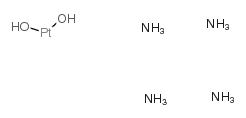15651-37-3
| 中文名 | 四氨合氢氧化铂n水 |
|---|---|
| 英文名 | Tetraammineplatinum(II) hydroxide hydrate (59% Pt) |
| 中文别名 | 四氨合氢氧化铂水合物 |
| 英文别名 |
TetraammineplatinumhydroxidehydratePtwhitepowder
Einecs 239-719-1 |
| 分子式 | H14N4O2Pt |
|---|---|
| 分子量 | 297.21500 |
| 精确质量 | 297.07600 |
| PSA | 53.42000 |
| LogP | 0.93950 |
| 蒸汽压 | 5990mmHg at 25°C |
| 计算化学 | 1.疏水参数计算参考值(XlogP):无 2.氢键供体数量:6 3.氢键受体数量:6 4.可旋转化学键数量:0 5.互变异构体数量:无 6.拓扑分子极性表面积6 7.重原子数量:7 8.表面电荷:0 9.复杂度:0 10.同位素原子数量:0 11.确定原子立构中心数量:0 12.不确定原子立构中心数量:0 13.确定化学键立构中心数量:0 14.不确定化学键立构中心数量:0 15.共价键单元数量:7 |
| 更多 | 1.性状:未确定 2.密度(g/mL,25/4℃):未确定 3.相对蒸汽密度(g/mL,空气=1):未确定 4.熔点(ºC):未确定 5.沸点(ºC,常压):未确定 6.沸点(ºC,5.2kPa):未确定 7.折射率:未确定 8.闪点(ºC):未确定 9.比旋光度(º):未确定 10.自燃点或引燃温度(ºC):未确定 11.蒸气压(kPa,25ºC):未确定 12.饱和蒸气压(kPa,60ºC):未确定 13.燃烧热(KJ/mol):未确定 14.临界温度(ºC):未确定 15.临界压力(KPa):未确定 16.油水(辛醇/水)分配系数的对数值:未确定 17.爆炸上限(%,V/V):未确定 18.爆炸下限(%,V/V):未确定 19.溶解性:未确定 |
|
Section 1: Product Identification Chemical Name:Tetraammineplatinum (II) hydroxide hydrate (59% Pt) CAS Registry Number:15651-37-3 Formula:Pt(NH3)4(OH)2.XH2O EINECS Number:239-719-1 Chemical Family:metal-ammine complexes Synonym:Platinum (II) tetraaammine dihydroxide
Section 2: Composition and Information on Ingredients IngredientCAS NumberPercentACGIH (TWA)OSHA (PEL) Title Compound15651-37-3100%0.002mg/m30.002mg/m3 Section 3: Hazards Identification Exposure to platinum compounds has been shown to cause wheezing, coughing, and running of the nose. Emergency Overview: Skin contact can lead to dermatitis. Primary Routes of Exposure:Ingestion, inhalation, skin Eye Contact:(If dust) May cause mild to moderate irritation of the eyes. Skin Contact:May cause slight to mild irritation of the skin. Inhalation:Inhalation of the dust may cause wheezing, coughing, shortness of breath. Ingestion:Ingestion may lead to dizziness, abdominal cramps, vomiting, bloody diarrhea, weakness, and convulsions. May be irritating to skin, eyes and respiratory tract. Exposure to platinum compounds may lead to wheezing, Acute Health Affects: coughing, and running of the nose. Skin exposure may lead to dermatitis. Chronic Health Affects:No information available on long-term chronic effects. NTP:No IARC:No OSHA:No SECTION 4: First Aid Measures Immediately flush the eyes with copious amounts of water for at least 10-15 minutes. A victim may need Eye Exposure: assistance in keeping their eye lids open. Get immediate medical attention. Wash the affected area with water. Remove contaminated clothes if necessary. Seek medical assistance if Skin Exposure: irritation persists. Remove the victim to fresh air. Closely monitor the victim for signs of respiratory problems, such as difficulty Inhalation: in breathing, coughing, wheezing, or pain. In such cases seek immediate medical assistance. Seek medical attention immediately. Keep the victim calm. Give the victim water (only if conscious). Induce Ingestion: vomiting only if directed by medical personnel. SECTION 5: Fire Fighting Measures Flash Point:not applicable Autoignition Temperature:none Explosion Limits:none Extinguishing Medium:carbon dioxide, foam or dry powder If this product is involved in a fire, fire fighters should be equipped with a NIOSH approved positive pressure Special Fire Fighting Procedures: self- contained breathing apparatus and full protective clothing. Hazardous Combustion andIf involved in a fire this material may emit toxic fumes. Decomposion Products: Unusual Fire or Explosion Hazards: No unusual fire or explosion hazards. SECTION 6: Accidental Release Measures Small spills can be mixed with vermiculite, sodium carbonate or other suitable non combustible adsorbent and Spill and Leak Procedures: swept up. SECTION 7: Handling and Storage Handling and Storage:Store cold, in a tightly sealed container. SECTION 8: Exposure Controls and Personal Protection Eye Protection:Always wear approved safety glasses when handling a chemical substance in the laboratory. Skin Protection:Wear protective clothing and gloves. Ventilation:To minimize exposure, handle the material in an efficient fume hood. If ventilation is not available a respirator should be worn. The use of respirators requires a Respirator Respirator: Protection Program to be in compliance with 29 CFR 1910.134. Ventilation:To minimize exposure, handle the material in an efficient fume hood. Additional Protection:No additional protection required. SECTION 9: Physical and Chemical Properties Color and Form:white to off-white solid Molecular Weight:297.23 Melting Point:no data Boiling Point:no data Vapor Pressure:no data Specific Gravity:no data Odor:none Solubility in Water:very soluble SECTION 10: Stability and Reactivity Stability:air and moisture stable (store cold) Hazardous Polymerization:no hazardous polymerization Conditions to Avoid:none Incompatibility:active metals Decomposition Products:Ammonia, nitrogen oxides, and platinum oxides. SECTION 11: Toxicological Information RTECS Data:No information available in the RTECS files. Carcinogenic Effects:No data Mutagenic Effects:No data Tetratogenic Effects:No data SECTION 12: Ecological Information Ecological Information:No information available SECTION 13: Disposal Considerations Disposal:Dispose of according to local, state and federal regulations. SECTION 14: Transportation Shipping Name (CFR):Non-hazardous Hazard Class (CFR):NA Additional Hazard Class (CFR):NA Packaging Group (CFR):NA UN ID Number (CFR):NA Shipping Name (IATA):Non-hazardous Hazard Class (IATA):NA Additional Hazard Class (IATA):NA Packaging Group (IATA):NA UN ID Number (IATA):NA SECTION 15: Regulatory Information TSCA:Listed in the TSCA inventory. SARA (Title 313):Not regulated by Title 313. Second Ingredient:None SECTION 16 - ADDITIONAL INFORMATION N/A |
| 风险声明 (欧洲) | 36/37/38-43 |
|---|---|
| 安全声明 (欧洲) | 26-36/37/39 |


